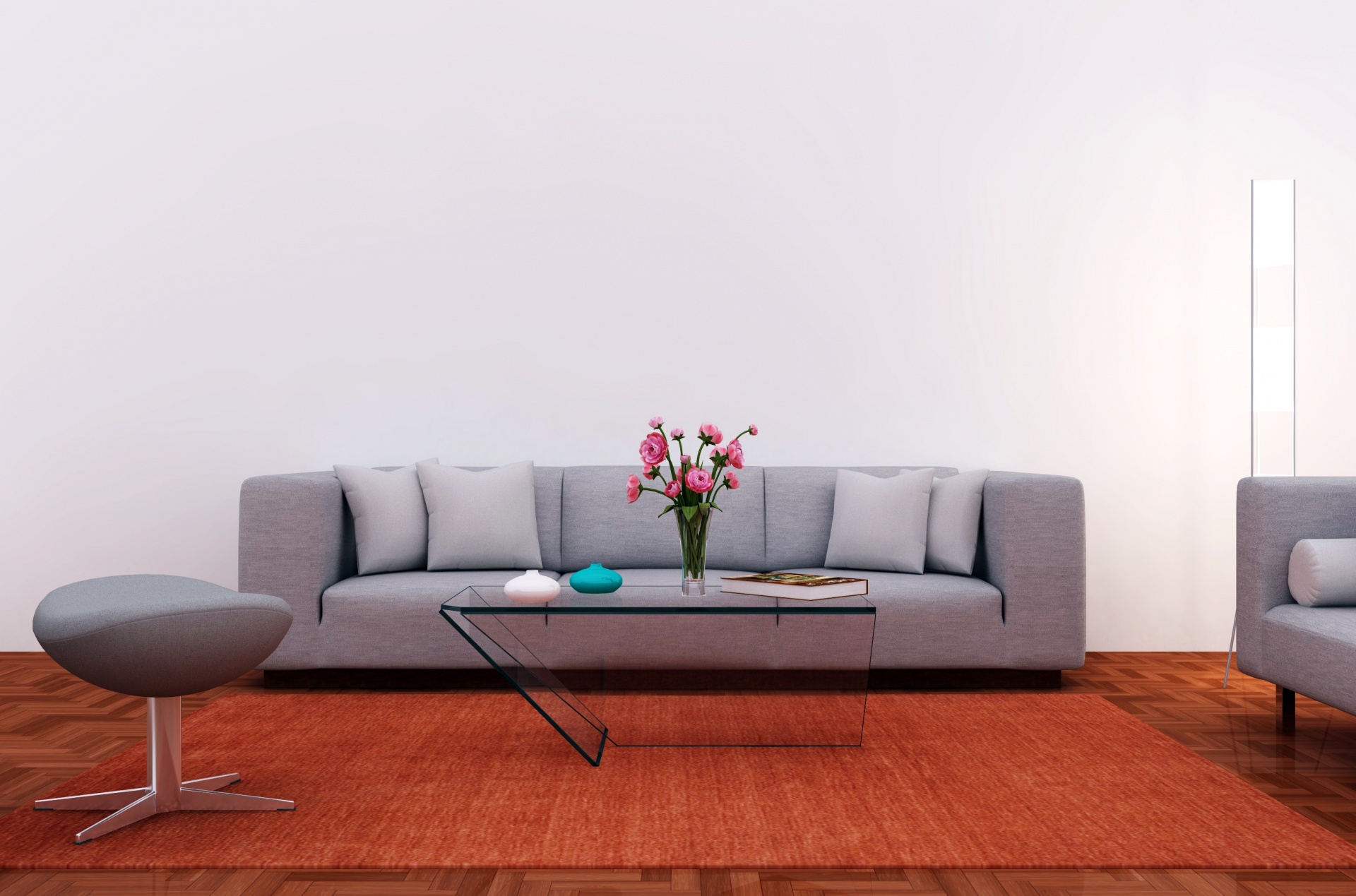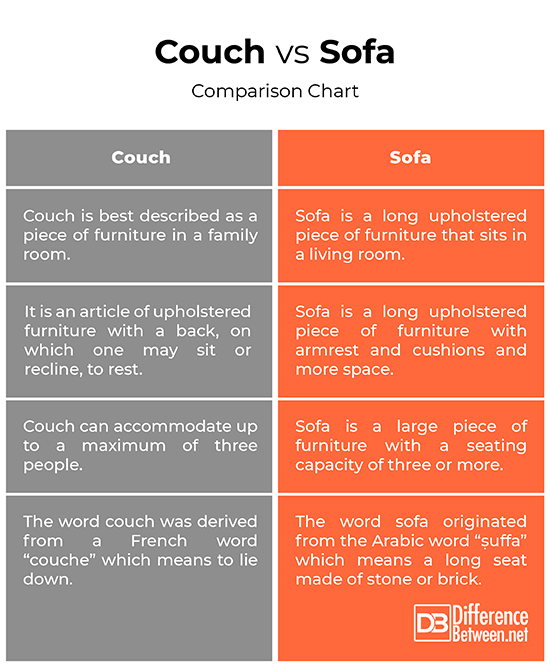Difference Between Couch and Sofa
Couch vs. Sofa
Words that you thought mean one thing can mean something entirely else altogether. This can be mostly because words come from different languages or if they are infrequently used terms to describe some piece of furniture of days gone by. Same is the case with the two commonly confused words – couch and sofa. Couch is a piece of furniture like a sofa, with a seating capacity of two to three. Couch is the commonly used term for sofa in the United States and both are often used interchangeably. Well, both couch and sofa refer to an upholstered piece of furniture where two or more people can sit.
Historically speaking, couch and sofa are two different things. In the good old days, the difference between the two probably had something to do with arms. But over time, the difference has become clearer. Although, many people use both the words interchangeably and they probably won’t mind using either of the words to describe the piece of furniture, they are quite different in terms of construction, style, and seating capacity. Let’s take a look at the two to better understand which one’s which.
Couch
The word couch was derived from a French word “couche” which means to lie down. It is a movable piece of furniture with no arms used to lie down. According to the American Heritage Dictionary, couch is an article of upholstered furniture with a back, on which one may sit or recline, presumably to rest. This is basically a piece of furniture where two or more people can sit. The idea is to provide a communal platform, like a comforting space for a family to lie down and relax. A couch is basically a small version of a sofa with some visible differences. Couch is supposedly with no arm like a chaise lounge. A couch is like a less formal sofa but can be easily confused with a sofa, except a couch can accommodate up to a maximum of three people. A couch can also be a comfortable sleeping spot for your beloved pet.
Sofa
A sofa can be described as a more comfortable version of a couch with armrest and cushions and more space with a seating capacity of usually more than three people. It is a long upholstered piece of furniture with a back and which can be often convertible into a bed. The word sofa is believed to have originated in the early 17th century from the Arabic word “ṣuffa” which means a long seat made of stone or brick. It is the most common word in Britain used to describe a big, comfortable piece of furniture that sits in your living room. Couch, canapé, lounge, and divan are just a few synonyms for sofa and they all basically mean the same thing, one way or another. Couch and settee are the alternate words for the word sofa. So, technically sofa is the right word, while couch is just a new, fancy term for a sofa.
Difference between Couch and Sofa
Origin of Couch vs. Sofa
– Couch is the commonly used term for sofa in the United States and both are often used interchangeably. The word couch was derived from a French word “couche” which means to lie down. It is a very old word which means something more bed-like. The word sofa, on the other hand, is believed to have originated in the early 17th century from the Arabic word “ṣuffa” which means a long seat made of stone or brick. Unlike a couch, sofa is something more bench-like.
Meaning
– According to the American Heritage Dictionary, couch is an article of upholstered furniture with a back, on which one may sit or recline, presumably to rest. This is basically a piece of furniture where two or more people can sit. A couch is like a less formal sofa with one or no arm. A sofa, on the other hand, can be described as a more comfortable version of a couch with armrest and cushions and more space. Sofa is a common word used in Britain to describe a big, comfortable piece of furniture that sits in your living room.
Style of Couch vs. Sofa
– Unlike a couch, which is best described as a piece of furniture in a family room, Sofa is a long upholstered piece of furniture with a back and which can be often convertible into a bed and sits in a living room. Couch is a form of a divan with no arms and they are smaller than sofas, like a chaise lounge. Sofas, on the other hand, tend to be the industry standard and it is described as a big, comfy furniture with long backs and sometimes upholstered in leather or fabric. Unlike a couch, sofa is a large piece of furniture with a seating capacity of three or more.
Couch vs. Sofa: Comparison Chart
Summary
Although, many people use both the words interchangeably and they probably won’t mind using either of the words to describe an upholstered piece of furniture, they are quite different in terms of construction, style, and seating capacity. A couch is like a less formal sofa with one or no arm. A sofa, on the other hand, can be described as a more comfortable version of a couch with armrest and cushions and more space. Technically, sofa is the right word or not, and Couch is just the alternate word for sofa. Well, both couch and sofa refer to an upholstered piece of furniture where two or more people can sit. Sofa accommodates three or more people, while couch has a seating capacity of two to three.
- Difference Between Caucus and Primary - June 18, 2024
- Difference Between PPO and POS - May 30, 2024
- Difference Between RFID and NFC - May 28, 2024
Search DifferenceBetween.net :
Leave a Response
References :
[0]Image credit: https://pixnio.com/free-images/2017/06/23/2017-06-23-06-57-48-900x600.jpg
[1]Image credit: https://www.publicdomainpictures.net/pictures/270000/velka/living-room-with-sofa.jpg
[2]Pubillones, Joseph. A Little Shimmer Goes a Long Way. California, US: Creators Publishing, 2016. Print
[3]Hall, Dennis and Susan G. Hall. American Icons. Westport, Connecticut: Greenwood Publishing Group, 2006. Print



